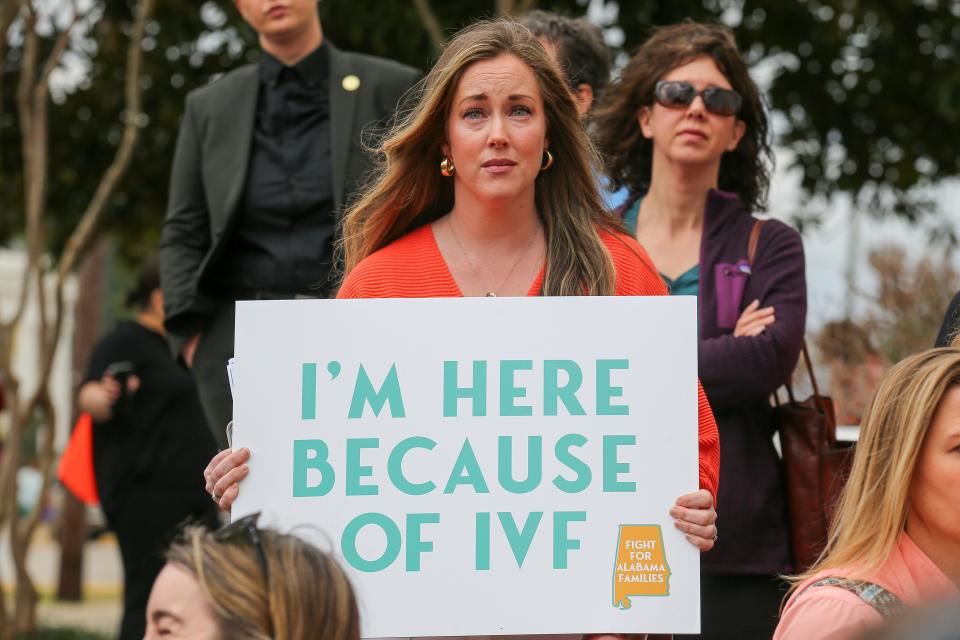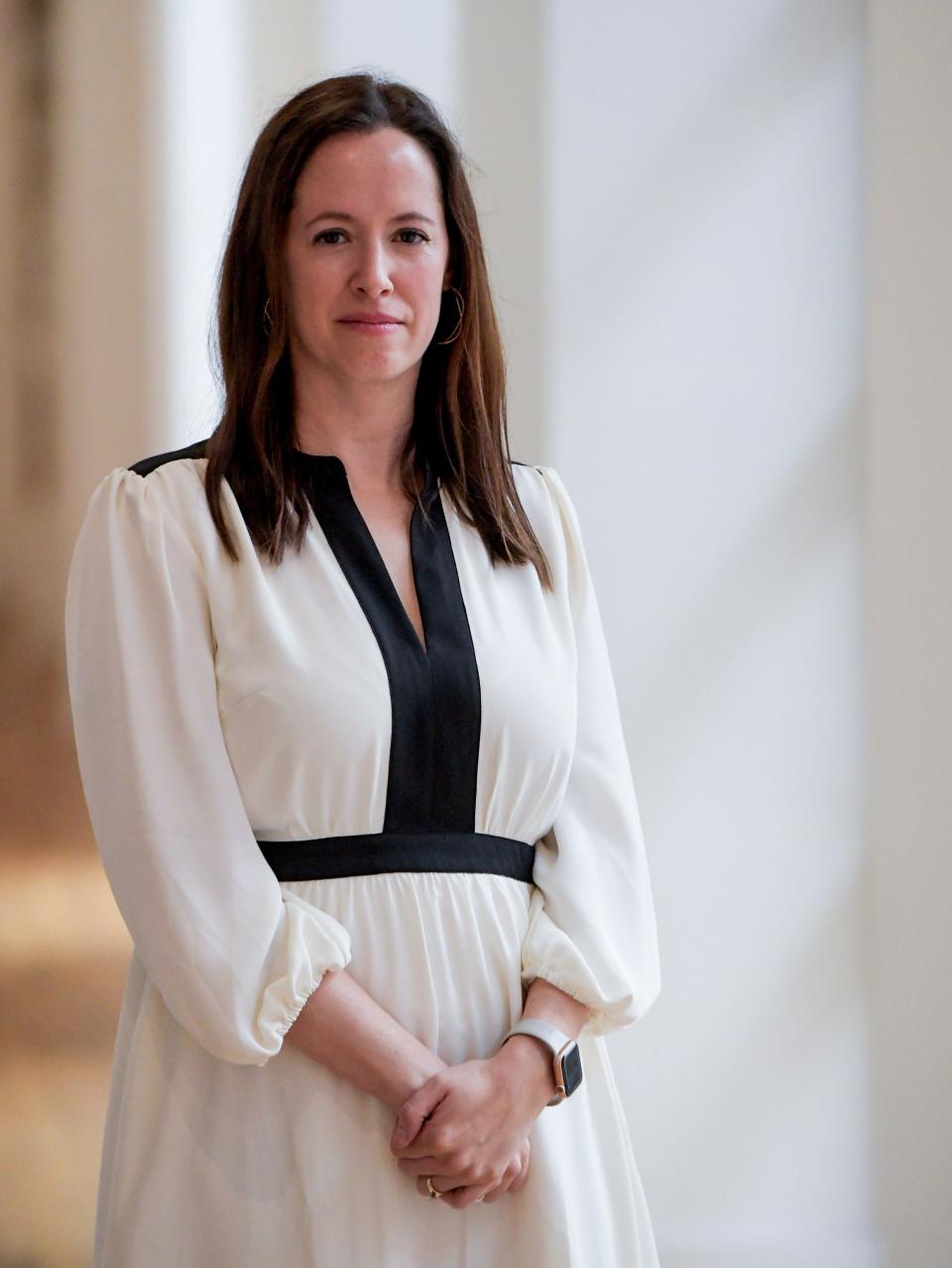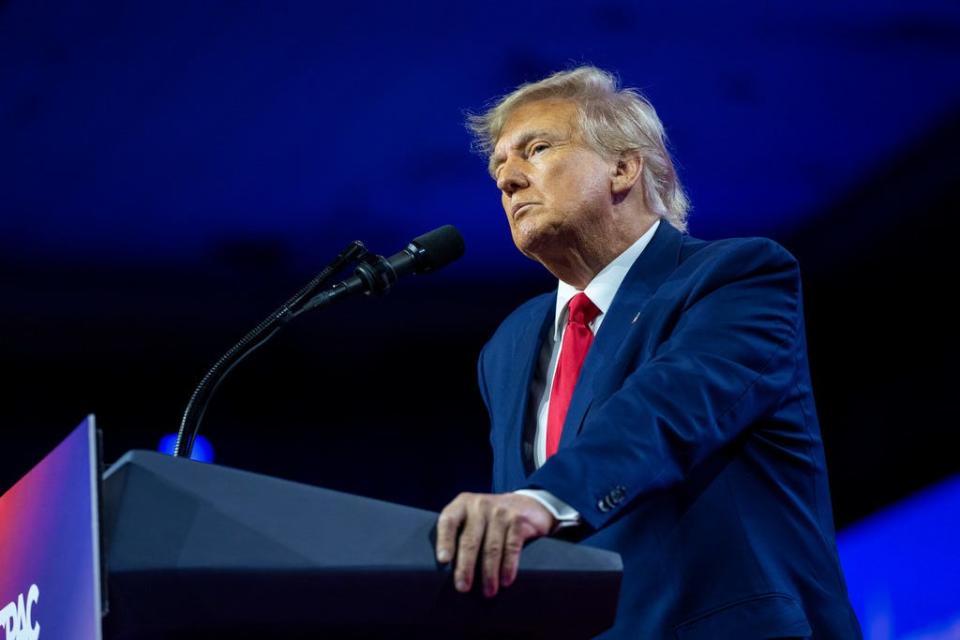'Heartbroken Alabama families': Blockbuster IVF ruling sends voters to Super Tuesday polls
MONTGOMERY, Ala. — When Ashley Stork first gave birth to her daughter, the moment felt very “surreal.”
For years, Stork didn’t know if she’d ever have children. She experienced a miscarriage in 2010 and an ectopic pregnancy in 2017 that resulted in the removal of her left fallopian tube.
“It was very lonely and very isolating,” said Stork, a store manager in Birmingham. Her three-year-old daughter has filled that void, thanks to in-vitro fertilization.
Now, as she tries to have a second child through IVF, Stork is one dozens of Alabamans who told USA TODAY they are heading to the polls to either challenge or affirm a recent blockbuster decision by the Alabama Supreme Court that's thrown the future of the procedure in doubt.
More: Alabama justice invoked 'the wrath of a holy God' in IVF opinion. Is that allowed?
The court ruled that frozen embryos created during IVF are “extrauterine children'' and have legal protections. Some Alabama clinics have paused IVF services, in which eggs are fertilized by sperm in a lab, out of fear they could face legal trouble for mishandling embryos.
“This has made me realize none of us are immune, and the decisions that they are making in those offices and on those floors and in those committee rooms affect me, they affect my friends, they affect my daughter,” Stork said. “And so our voice and our vote does matter. And I hope that that really encourages people to get to the polls in November.”
The Alabama ruling seized national attention as Democrats capitalized on the issue as part of a broader effort to attack Republicans on abortion and reproductive healthcare after the Supreme Court’s decision to overturn Roe v. Wade in 2022.

A state ruling with national implications
There’s a lot at stake nationally with the IVF ruling, experts and advocates warn.
The ruling has intensified the fight over abortion, raising questions such as whether donors are legally protected from destroying their embryo or what rights exactly an embryo has. It could have wide-ranging implications for states that have introduced “personhood bills,” which aim to define human life as beginning at conception or fertilization, while eliminating access to legal abortions.
An Axios-Ipsos poll conducted in February found that 66% of Americans oppose designating embryos as people and holding those who destroy them legally responsible. Republicans are evenly split on the question, with 49% supporting the ruling and 49% opposing it.
“I think IVF is an issue that hasn't been politicized before and could be one that could get people thinking about the ways that reproductive health is connected to politics and engage them,” said Shana Gadarian, a political science professor at Syracuse University. “It may push people to the polls.”

IVF decision motivates some voters
Kelli Wright, 39, doesn’t normally make time to vote in primary elections, unless there’s an issue she really cares about. IVF is one of them. Almost half of her friends ? most of whom are in their mid to late 30’s ? have used fertility treatments to bear children, she said.
Wright, a Democrat, said she strongly believes in reproductive rights and feels the best person to deliver on that is President Joe Biden.
Biden’s campaign blamed former President Donald Trump for the Alabama ruling, claiming it was a result of the Supreme Court's decision ? made possible by Trump's three conservative appointees ? to overturn Roe v. Wade. Trump has called on the Alabama court to reverse its decision.
“An issue like reproductive healthcare should not be different from state to state because it affects women and families regardless of where they live,” said Wright, a catering manager in Fairhope. “So in my opinion it should be dealt with at the federal level and not left for states to decide.”

Sarah Holt, 38, said that her experience struggling to conceive was one of the “darkest times” of her life. When the Alabama ruling came down, she felt angry over the fact that women had to pause their own IVF treatments.
Holt, a Democrat and schoolteacher, said she voted for former South Carolina Gov. Nikki Haley in the Republican primary on Tuesday. She plans to vote for Biden in November.
“I want to see people in office who reflect me," she told USA TODAY. "If you're going to make laws that affect women's reproductive health, you need to know about women's reproductive health.”

Supporters of the Alabama ruling say it made them feel more empowered to vote.
Just a few miles away from the Edmund Pettus Bridge in Selma, where Vice President Kamala Harris gave remarks Sunday blasting the IVF decision, Tina Glasgow, 78, said the Alabama ruling was a positive step to ensure that “we’re not losing our babies.”
Glasgow said the court's ruling, which prevents the destruction of fertilized embryos, would help women who were unable to conceive. “I deal with a lot of barren women who cannot have babies,” said Glasgow. “They would love to, you know?”
Others focused on local politics
But other voters said the IVF ruling wouldn't affect how they voted.
After casting her Republican primary vote at the Alabama State University in Montgomery on Tuesday, Sandra Aplin, 76, said, “I really don’t have a dog in that fight.”
“I try to make my decisions the best I can, as informed as I can do, only if it affects me. The judges ? they're the ones that have that responsibility. I'm not gonna lay awake at night worrying about something I did," said Aplin, director of the Gallery One Fine Art in Montgomery.
Likewise, Marilee Davis, 42, said she sees Alabama's Super Tuesday vote as irrelevant to IVF.
“As an IVF family, my husband and I know that any redress through the polls would not be nearly timely enough for the many affected, heartbroken Alabama families,” said Davis, a Republican.
More: Alabama court rules frozen embryos are children, chilling IVF advocates
Standing outside a polling place in Montgomery, Cecilia Middleton said she was “disgusted” when the IVF ruling came out.
“Just disgusted,” said Middleton. "I mean, the government shouldn't have anything at all to do with stuff like that...Government sticking their nose where it don’t belong.”
But Middleton said she would never vote for a Democrat. She voted for Trump in the GOP primary. “When he was in office before we were thriving,” said Middleton. “We weren't hurt like we are now.”
Grassroots efforts to counter the IVF ruling have mostly focused a statewide solution.
Corinn O’Brien, who started the group Fight for Alabama Families after the IVF ruling, led a rally near the Alabama State Capitol on Feb. 28 to urge legislators to pass a bill protecting IVF treatment. Over 300 people attended, and the group has sent over 17,000 emails to legislators since last week, she said.
O’Brien is eight weeks pregnant with her second child after undergoing IVF treatment, but she's unsure if the pregnancy will be viable.
"I don't think I really quite grasp all the wide ranging consequences this decision may have," she said. "It is really scary.”
This article originally appeared on USA TODAY: Will Alabama IVF ruling motivate voters in state for 2024 election?
